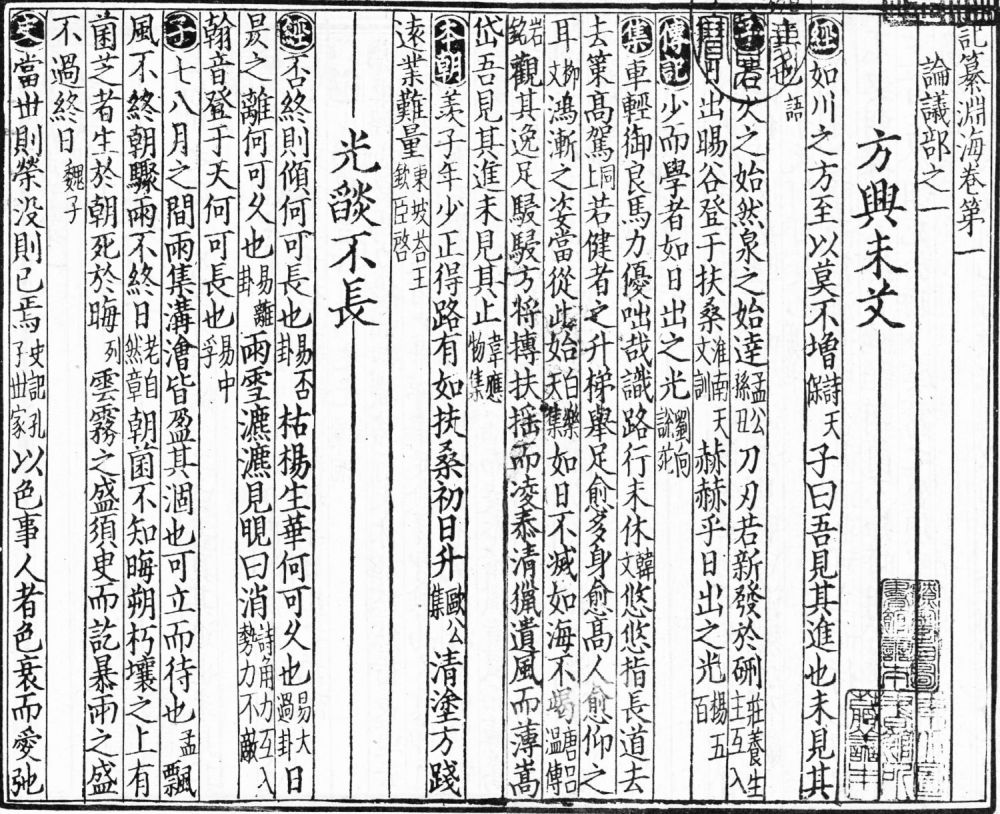Jizuan yuanhai 記纂淵海 "Profound ocean of records and compilations" is an encyclopedia compiled during the Southern Song period 南宋 (1127-1279) by Pan Zimu 潘自牧 (jinshi degree 1195), courtesy name Muzhi 牧之.
The book was finished in 1209. It is divided in a first collection (qianji 前集) of 195 juan , a second collection (houji 後集) of 125 juan, of which only 95 juan survive, and a supplementary collection (buji 補集). The book was divided into 22 parts covering 1,246 topics, of which in fact only 1,195 topics are treated.
 |
Reprint by Zhonghua Shuju 中華書局, 1988. |
The edition in the imperial series Siku quanshu 四庫全書 has only 100 juan and is based on a version from the Wanli reign-period 萬曆 (1573-1619). This edition is divided into the chapters "Heaven and astronomy" (Tiandao 天道, 5 juan), "Earth and geography" (Dili 地理, 20 juan), "human affairs" (Renshi 人事, 64 juan), and "Objects and things" (Wulei 物類, 11 juan). A print from the Song period has 195 fascicles, and a print from the Ming period 明 (1368-1644) with moveable letters has 200 fascicles. The 100-juan version is generally believed to be the original. In the foreword, Chen Wensui 陳文燧 (b. 1535) reports that he had obtained the first part somewhere in Fujian or Sichuan and the second part in Zhejiang, and thereupon unified these two fragments into one book.
The Jizuan yuanhai has its strengths in the explanation of general fields, and less in the detailed description of particular issues.
There is a print from 1579 and the edition in the Siku quanshu. In 1988, the Zhonghua Shuju Press 中華書局 republished the early Song-period edition.
| 前集 First Collection (195-juan version) | ||
|---|---|---|
| 1.-36. | 論議 | Discussions |
| 37.-79. | 性行 | Human character and comportment |
| 80.-101. | 識見 | Introduction and encounters |
| 102.-111. | 人倫 | Human relations |
| 112.-115. | 人道 | The human way |
| 116.-121. | 人情 | Human emotions |
| 122.-135. | 人事 | Human affairs |
| 136.-137. | 人己 | The human self |
| 138. | 物理 | The order of things |
| 139.-145. | 敘述 | Description |
| 146.-149. | 接物 | Objects |
| 150.-153. | 問學 | Studying |
| 154.-156. | 言語 | Language |
| 157.-159. | 政事 | Governance |
| 160.-165. | 名譽 | Name and fame |
| 166.-170. | 著述 | Writing |
| 171.-175. | 生理 | Living patterns |
| 176.-179. | 喪紀 | Funerals |
| 180.-182. | 兵戎 | Military affairs |
| 183.-185. | 釋 | Buddhism |
| 186.-188. | 仙道 | Daoism |
| 189.-195. | 閫儀 | Female affairs |
| 後集 Houji Later collection | ||
| 三才 | The Three Talents Heaven, Earth and Man | |
| 天文 | Astronomy | |
| 混元 | The origin of the cosmos | |
| 君道 | The way of the ruler | |
| 皇親 | The emperor and his relatives | |
| 職官 | State offices | |
| 時令 | Edicts according to the seasons | |
| 祥瑞 | Omens and portents | |
| 災異 | Natural disasters | |
| 地理 | Geography | |
| 郡縣 | Local administration | |
| 禮儀 | Rites and etiquette | |
| 樂 | Music | |
| 民業 | Professions | |
| 技術 | Skills and arts | |
| 文房 | The study | |
| 字學 | Writings and characters | |
| 果實 | Fruits | |
| 花卉 | Flowers and herbs | |
| 木 | Trees | |
| 竹 | Bamboos | |
| 禽 | Birds | |
| 獸 | Mammals | |
| 水族 | Aquatic animals | |
| 介 | Scaly animals | |
| 蟲 | Creeping animals | |